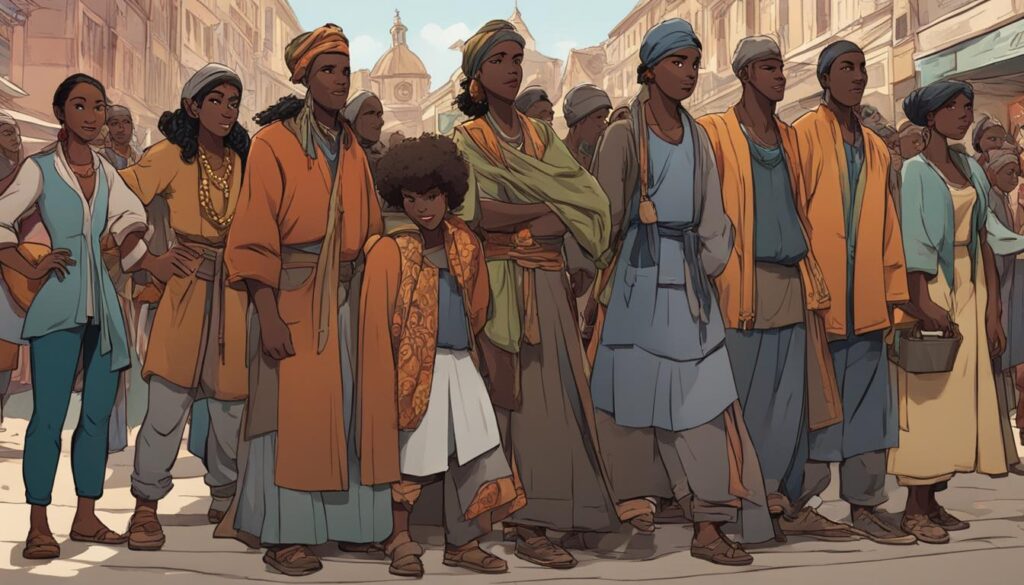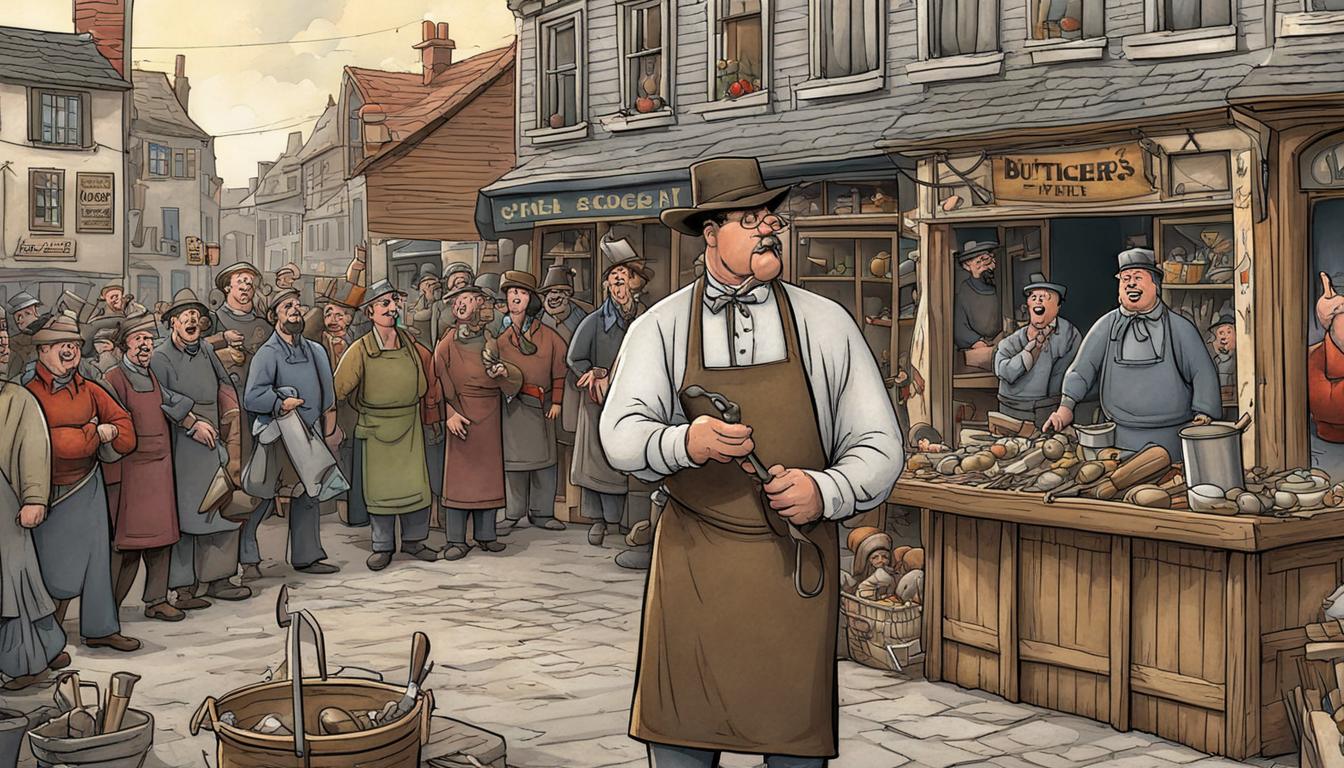Louise Erdrich is renowned for her ability to captivate readers with her powerful storytelling, and her novel “The Master Butchers Singing Club” is no exception. Set against the backdrop of post-World War I Germany and America, this gripping tale follows the life of Fidelis Waldvogel, a master butcher who emigrates to America with his new bride, Eva, and fellow butcher, Delph, to start a new life.
As the story unfolds, readers witness Fidelis and Eva’s struggle to adapt to their new home, battling with issues of loss, love, and identity. Erdrich’s expertly crafted narrative weaves together a poignant story that is full of heart and emotion.
If you’re looking for a book that will leave a lasting impression, “The Master Butchers Singing Club” is an excellent choice.
Key Takeaways:
- “The Master Butchers Singing Club” is a novel written by Louise Erdrich.
- The book is set against the backdrop of post-World War I Germany and America, and follows the life of Fidelis Waldvogel, a master butcher.
- The novel explores themes of love, loss, and identity as Fidelis and his wife, Eva, struggle to adapt to their new home.
- Erdrich’s expert storytelling and poignant narrative make “The Master Butchers Singing Club” a captivating read.
- The book has received positive critical reception and continues to be an important work in modern literature.
About the Author
Louise Erdrich, born on June 7, 1954, is an American writer of novels, poetry, and children’s books. She is of Ojibwe, German, and French ancestry and grew up in North Dakota. Erdrich attended Dartmouth College and studied creative writing with poet Michael Harper at Johns Hopkins University. She has worked as a teacher, editor, and independent bookseller.
Erdrich is the author of numerous critically acclaimed books, including “Love Medicine,” “The Beet Queen,” and “The Round House.” She has won numerous awards throughout her career, including the National Book Award for Fiction for “The Round House” in 2012 and the Library of Congress Prize in American Fiction in 2015.
Erdrich is renowned for her poignant storytelling and unique writing style, which often explores the complexities of Native American life and culture. “The Master Butchers Singing Club,” her fourth novel, is a testament to her literary prowess and captivating narrative style.
Synopsis
Set in the small town of Argus, North Dakota, “The Master Butchers Singing Club” follows the lives of a group of German immigrants after World War I. The story begins with the arrival of Fidelis Waldvogel, a skilled butcher who quickly finds success with his trade. Alongside him is Delphine Watzka, who runs a local diner and captures Fidelis’s heart. However, their relationship is put to the test when Fidelis must return to Germany to confront his past. Meanwhile, their friends and neighbors face their own challenges, from hidden secrets to unexpected tragedies.
Through vivid characters and a richly-drawn setting, Louise Erdrich creates a moving tale of love, loss, and redemption. As the characters navigate the difficulties of their past and present, readers are drawn into a heartrending story of resilience and hope.
Themes
Louise Erdrich’s The Master Butchers Singing Club delves into several prominent themes that offer captivating insights into the human experience.
The Power of Love
Throughout the novel, the transformative power of love is explored through various relationships. From Fidelis and Eva’s enduring bond to Delphine and Cyprian’s forbidden passion, Erdrich illuminates the ways in which love has the ability to heal and transform even the most broken of souls.
Resilience in the Face of Adversity
The impact of war is a central theme in The Master Butchers Singing Club, and Erdrich uses her characters’ experiences to highlight the human capacity for resilience. Through Fidelis and the other war veterans who return to Argus after World War I, the novel explores the challenges of rebuilding in the aftermath of trauma and tragedy.
The Search for Identity
Many of the characters in The Master Butchers Singing Club struggle with their identity and sense of place in the world. This theme is particularly evident in Delphine, who grapples with her mixed heritage and her place in the small North Dakota community. Erdrich highlights the challenges of reconciling one’s past with one’s present, and the ways in which the search for identity can be a lifelong journey.
| Themes | Description |
|---|---|
| The Power of Love | The transformative power of love is explored through various relationships, illuminating the ways in which it has the ability to heal and transform even the most broken of souls. |
| Resilience in the Face of Adversity | The impact of war is examined, highlighting the human capacity for resilience in the face of trauma and adversity. |
| The Search for Identity | The characters’ search for their true identity is explored, highlighting the challenges of reconciling one’s past with one’s present. |
These themes are woven masterfully into the rich tapestry of Erdrich’s narrative, offering readers a glimpse into the complex nature of the human experience.
Characters
“The Master Butchers Singing Club” features a rich cast of characters, each with their own unique personality and role in the story. The central protagonist is Fidelis Waldvogel, a German immigrant who becomes a skilled butcher in Argus, North Dakota. Waldvogel is joined by his wife Eva, a woman haunted by the events of her past.
The story also features a range of supporting characters, including:
| Character | Description |
|---|---|
| Ciprian Yanko | A Romanian musician who becomes friends with Waldvogel and helps him through difficult times |
| Zoe Kashpaw | A young Native American girl searching for her identity in a changing world |
| Delphine Watzka | A wealthy woman who becomes infatuated with Waldvogel and his abilities as a butcher |
| Mary Wells | A young woman who falls in love with one of Waldvogel’s sons, leading to a complicated family dynamic |
Each character brings their own story and struggles to the narrative, helping to weave a complex and emotionally resonant tale that explores the human experience.

Writing Style
Louise Erdrich’s writing style is as unique and captivating as the story she tells. With a keen eye for detail and a gift for weaving together complex narratives, Erdrich takes readers on a journey through time and space that is both thought-provoking and emotionally resonant.
One of the most notable aspects of Erdrich’s writing style is her use of symbolism to convey larger themes and ideas. Throughout “The Master Butchers Singing Club,” Erdrich utilizes imagery such as the river, the moon, and the birds to represent various concepts, such as the passage of time, love, and mystery, respectively. This technique creates a rich and layered narrative that rewards readers who take the time to delve deeper.
Erdrich is also a master of character development, bringing each of the protagonists in “The Master Butchers Singing Club” to life with nuance and depth. Through her careful attention to their inner thoughts and motivations, Erdrich ensures that each character is fully realized and complex, with flaws and strengths that make them feel real and relatable.
Another hallmark of Erdrich’s writing style is her use of language. With a poetic sensibility and a keen ear for dialogue, Erdrich’s prose is both lyrical and conversational. Her lush descriptions of the natural world and her deep understanding of human emotion make her writing feel organic and authentic, drawing readers into the story and keeping them engaged until the very end.
Overall, Louise Erdrich’s writing style is a testament to her talent as a storyteller. Through her use of symbolism, character development, and language, Erdrich creates a world that is both beautiful and complex, leaving readers with a profound sense of awe and respect for her craft.
Critical Reception
“The Master Butchers Singing Club” has garnered widespread critical acclaim, and for good reason. Many reviewers have praised Erdrich’s powerful storytelling and ability to weave together complex themes with ease.
“Erdrich is a master storyteller, and ‘The Master Butchers Singing Club’ is a testament to her talent. From start to finish, this novel is a captivating and deeply moving read that stays with you long after you turn the final page.” – The New York Times
Despite its positive reception, the book has also faced criticism from some reviewers who found certain aspects of the story to be lacking or underdeveloped. However, these criticisms are far outweighed by the overwhelming number of positive reviews.
| Publication | Review |
|---|---|
| Chicago Tribune | “…a stirring epic that highlights the beauty of resilience and the power of love. Erdrich’s talent shines through on every page, making this a must-read for any fan of historical fiction.” |
| The Guardian | “While ‘The Master Butchers Singing Club’ isn’t without its flaws, Erdrich’s ability to craft such a rich and layered story more than makes up for any missteps.” |
| Los Angeles Times | “Erdrich has once again proven herself to be one of the most talented and insightful writers of our time, and ‘The Master Butchers Singing Club’ is a true testament to her skill.” |
Overall, the critical reception of “The Master Butchers Singing Club” has been overwhelmingly positive, cementing its place as a modern classic that will be cherished by readers for years to come.
Impact and Legacy
The Master Butchers Singing Club has left a lasting impression on the literary world, becoming a classic tale of love, war, and resilience. Louise Erdrich’s poignant portrayal of post-WWI America and the struggles of its inhabitants have earned it a revered place in American literature.
The novel’s legacy extends beyond its literary merits, as it has also contributed to broader cultural conversations and paved the way for other works exploring similar themes. Its importance lies in its ability to capture the essence of human experience and connect with readers on a deeply emotional level.
“This is a book that transcends the limitations of genre and compels us to examine the power of love, family, and community in the face of unspeakable tragedy.” – The New York Times Book Review
The Master Butchers Singing Club continues to inspire readers and writers alike, offering a timeless reminder of the human capacity for resilience and the power of storytelling to capture the complexities of the human experience.
Conclusion
Louise Erdrich’s “The Master Butchers Singing Club” is a magnificent read that captures the human spirit’s resilience in the face of tragedy. The novel’s storyline is captivating, and readers will find themselves engrossed in the lives of the different characters. Through the book’s themes of love, hope, and redemption, Erdrich delivers a powerful message that inspires readers long after they’ve read the final chapter.
Erdrich’s unique writing style is masterful, and readers will appreciate the effort she puts into bringing the story to life. Her vivid descriptions and the way she develops characters’ personalities make the story even more engaging. “The Master Butchers Singing Club” has received widespread critical acclaim, and its impact on literature is significant. Its exploration of the impact of war and the human experience has made it an essential read for anyone interested in literature and history.
Although the book was published over a decade ago, its impact and legacy remain strong. It is still being read and enjoyed by new generations of readers. It has left a lasting impression on both literature and culture, and its themes and narrative continue to inspire people to this day.
In conclusion, “The Master Butchers Singing Club” is a must-read for anyone looking for an inspiring and powerful story that will touch their hearts and leave them feeling inspired. Louise Erdrich has delivered a masterpiece that will be remembered for generations to come.



